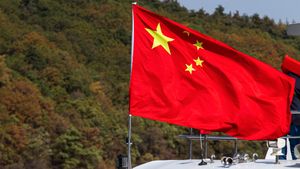Trump's Import Tariffs Don't Violate NATO Agreements

JAKARTA - The new import rate of the United States announced by President Donald Trump did not violate the NATO agreement.
NATO Secretary-General Mark Rutte confirmed this on Friday, April 4, after meeting with NATO foreign ministers in Brussels.
As reported by Reuters, Rutte responded to reporters' questions referring to article 2 in the NATO agreement stating: "(NATO allies) will seek to eliminate conflicts in their international economic policies and will encourage economic collaboration between one or all of them."
Most recently, China on Friday announced a series of countermeasures against rates imposed by President Donald Trump, including an additional 34% tariff for all US goods and export restrictions on some rare earth metals, deepening an escalating trade war.
China's Ministry of Finance said additional tariffs would be imposed from April 10.
Trump on Wednesday announced China would be subject to a tariff of 34%, in addition to the 20% tariff he had imposed earlier this year, bringing the total new levies to 54%.
Farm trade has been hit again due to Chinese customs imposing direct suspension of sorghum imports from C&D Inc. grain exporters, as well as poultry and bone flour from three US companies.
另请阅读:
Beijing also announced export controls of rare and heavy earth metals, including Samrium, gadolinium, terbium, dysprosium, utetium, skandium, and itrium to the United States, which takes effect from April 4.
"The purpose of implementing export control by the Chinese government on related goods in accordance with the law is to better maintain national security and interests, and to fulfill international obligations such as non-proliferation," the trade ministry said in a statement.
Beijing has also added 16 US entities to its export control list, which prohibits the export of multiple-functional goods to affected companies.
Eleven other US companies were added to the list of "unreliable entities", allowing Beijing to take punitive action against foreign entities.
Targeted companies include Skydio Inc. and BRINC Drones for selling weapons to democratically-ruled Taiwan, which China claims as part of its territory.
China's trade ministry said the targeted companies were seriously "destalling" China's national sovereignty, security, and development interests and would be barred from making new investments, imports, and export activities in China.
China has also launched an anti-dumping investigation into imports of certain medical CT tubes from the US and India, and a broader industrial competitiveness investigation into imports of medical CT tubes.


